Charles E W Bean, Diaries, AWM38 3DRL 606/247/1 - 1917 - 1933 - Part 8
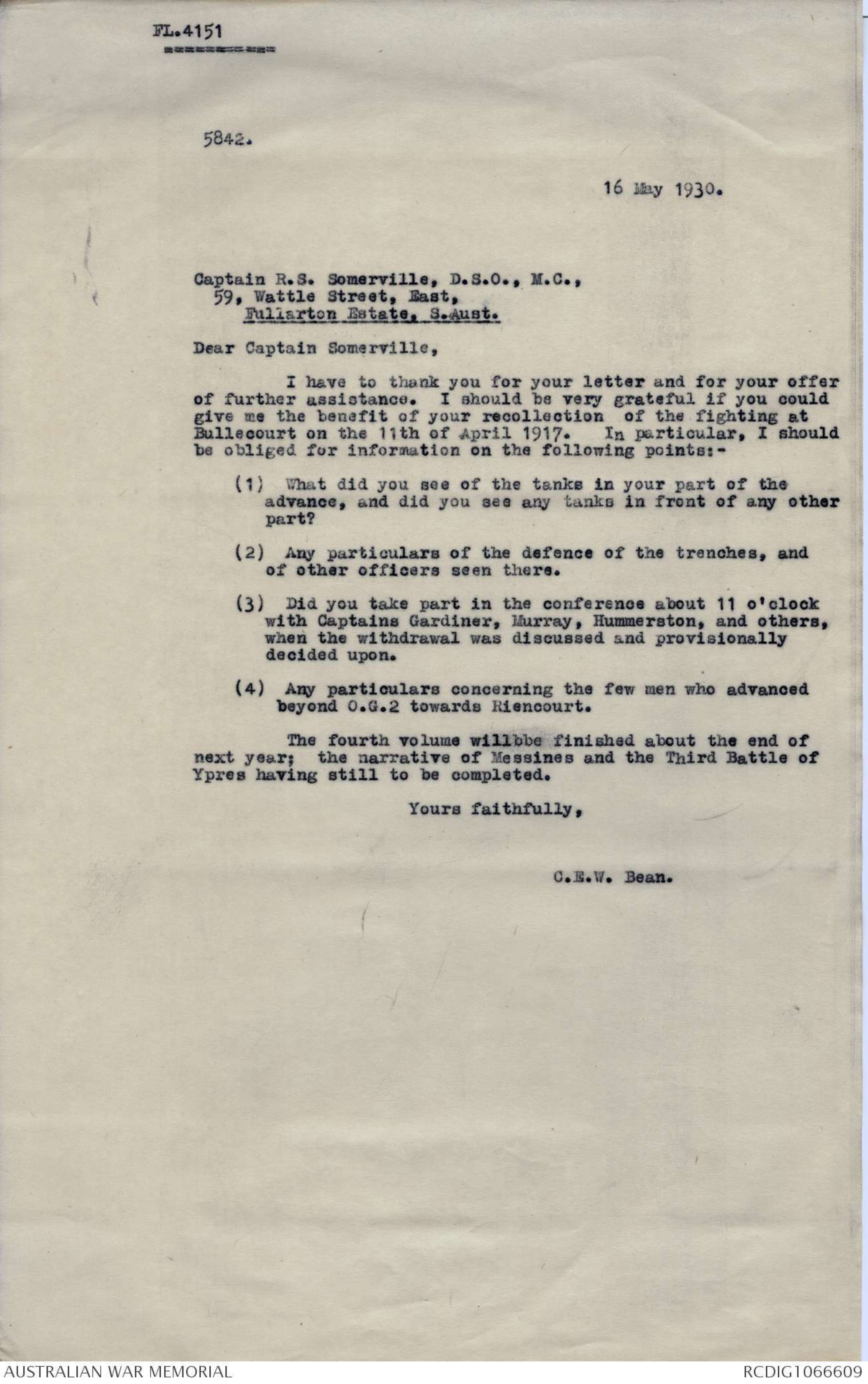
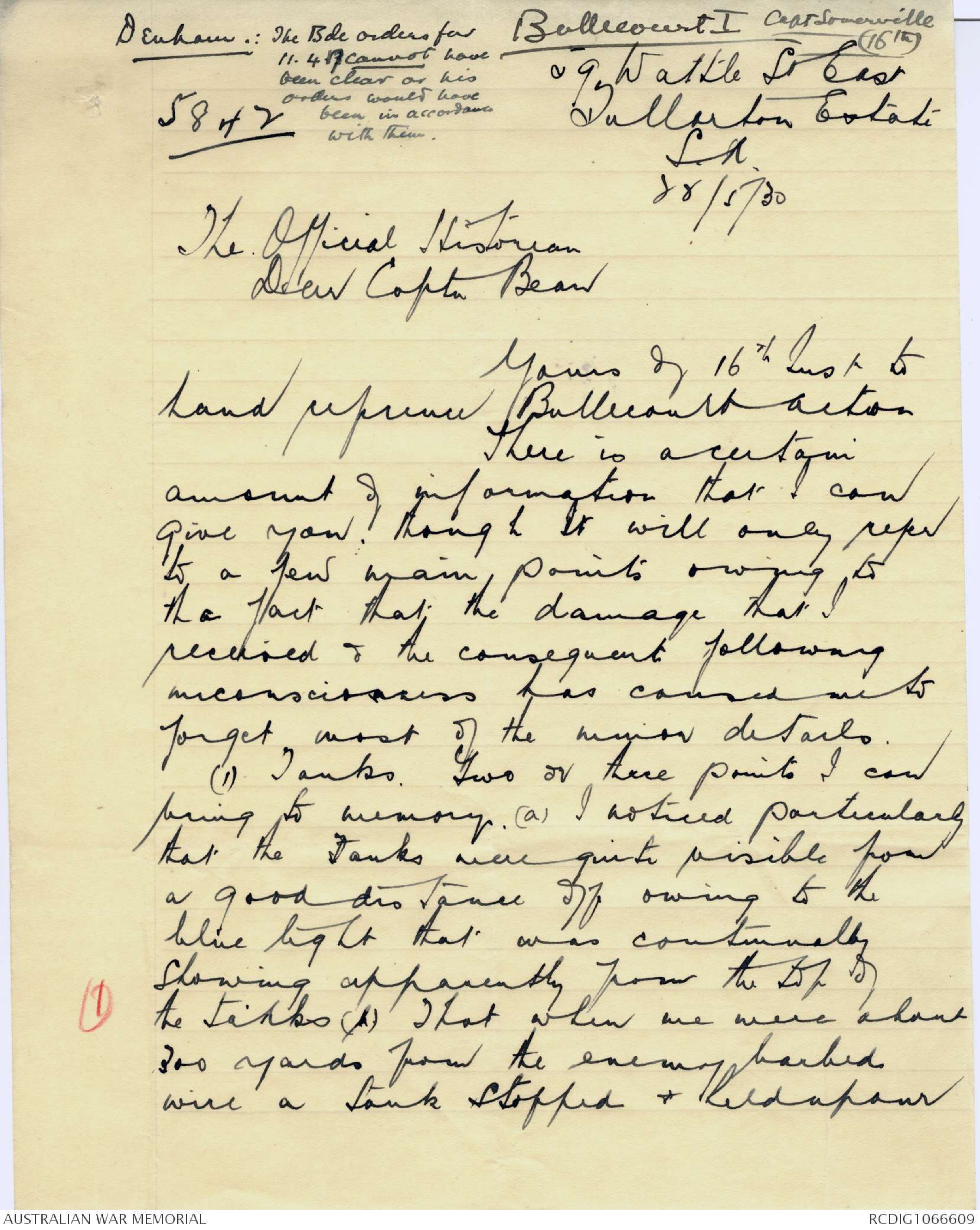
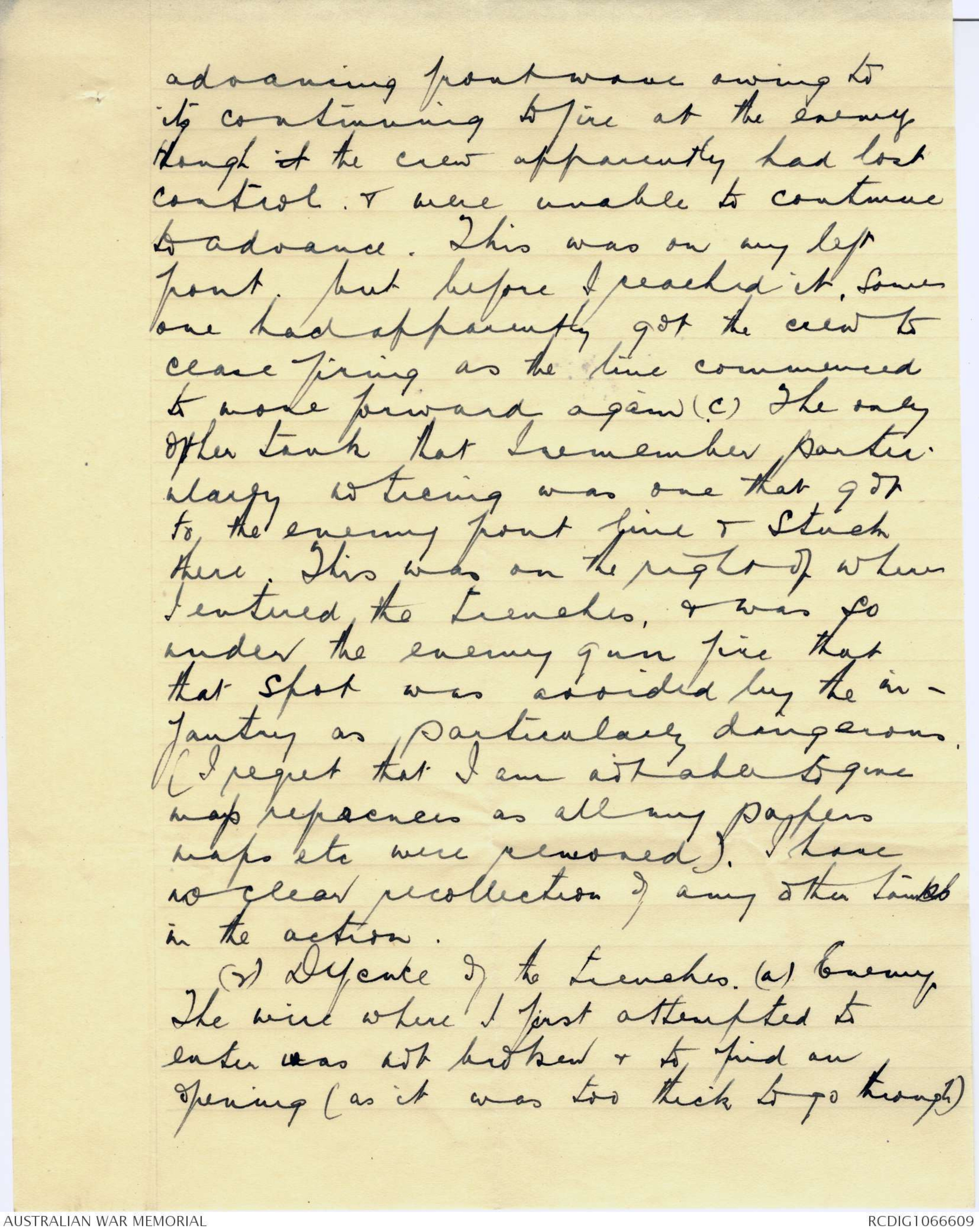
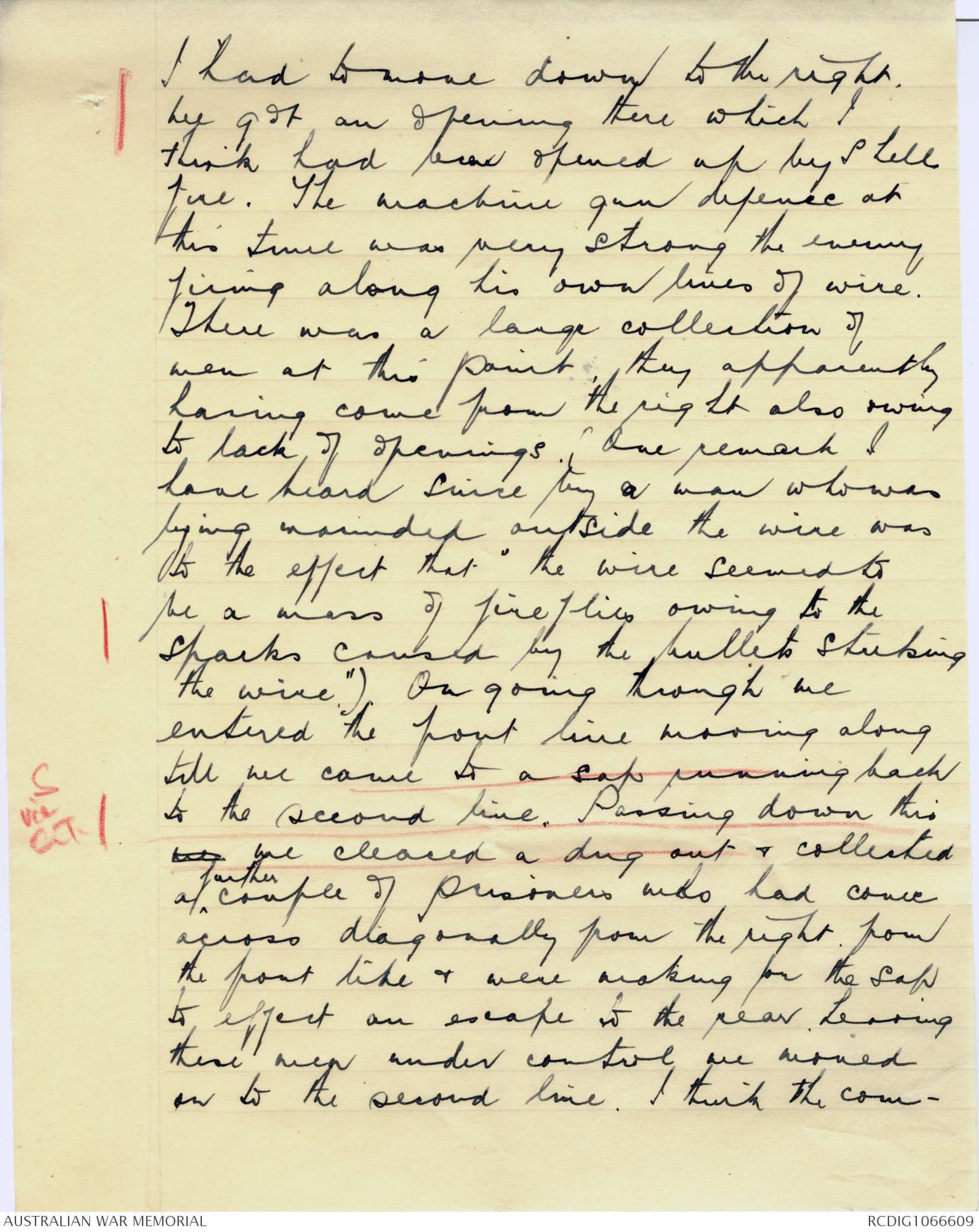
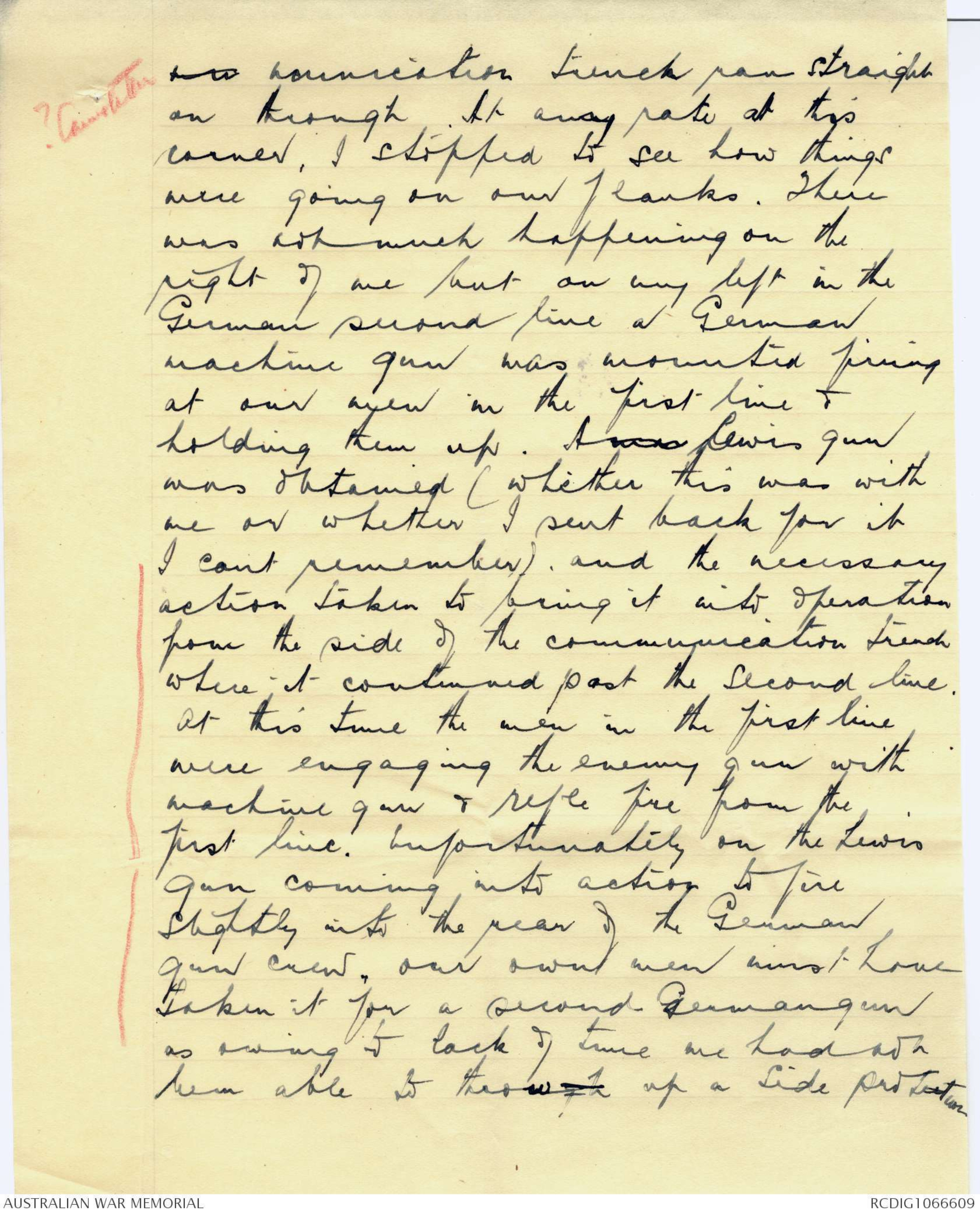
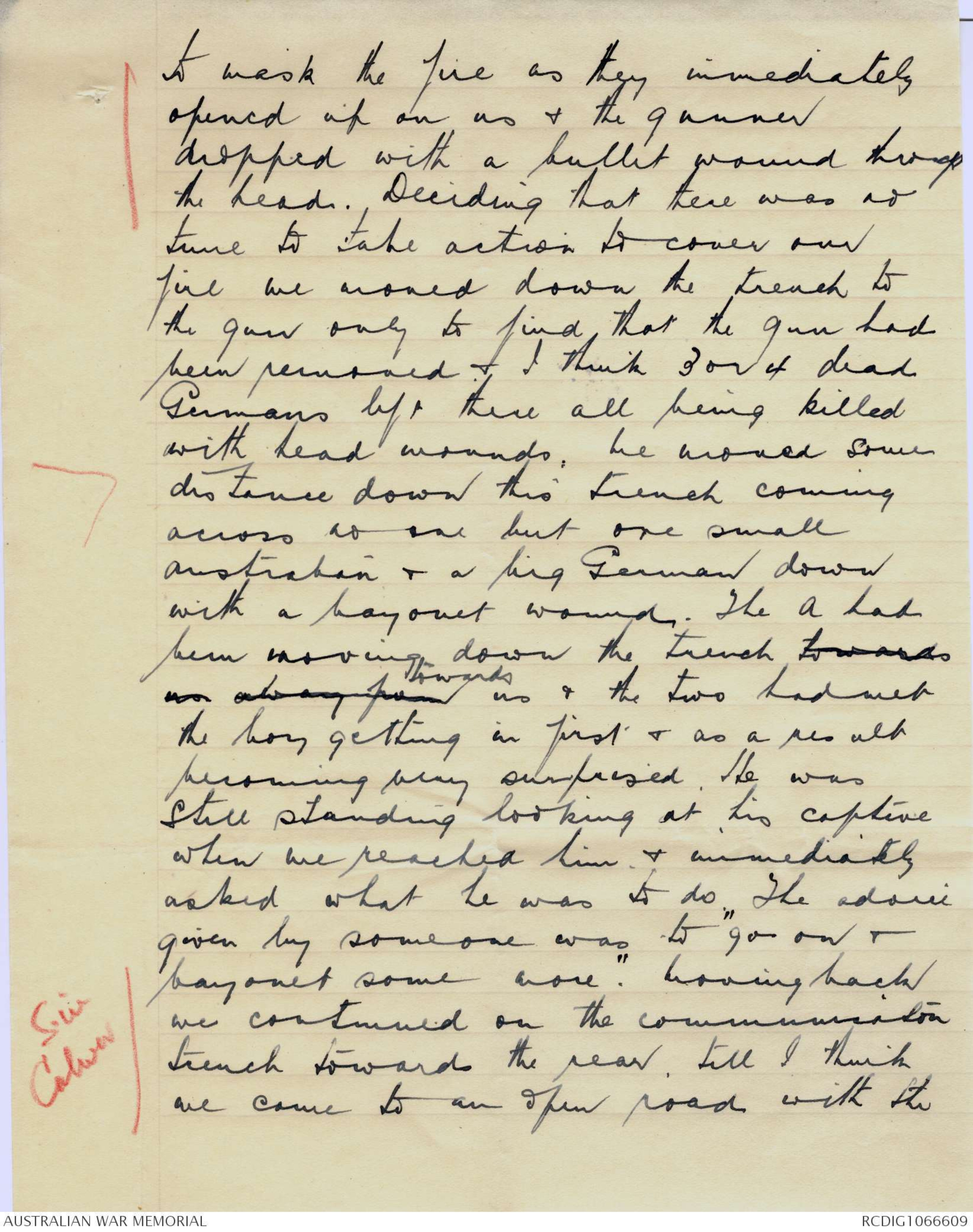
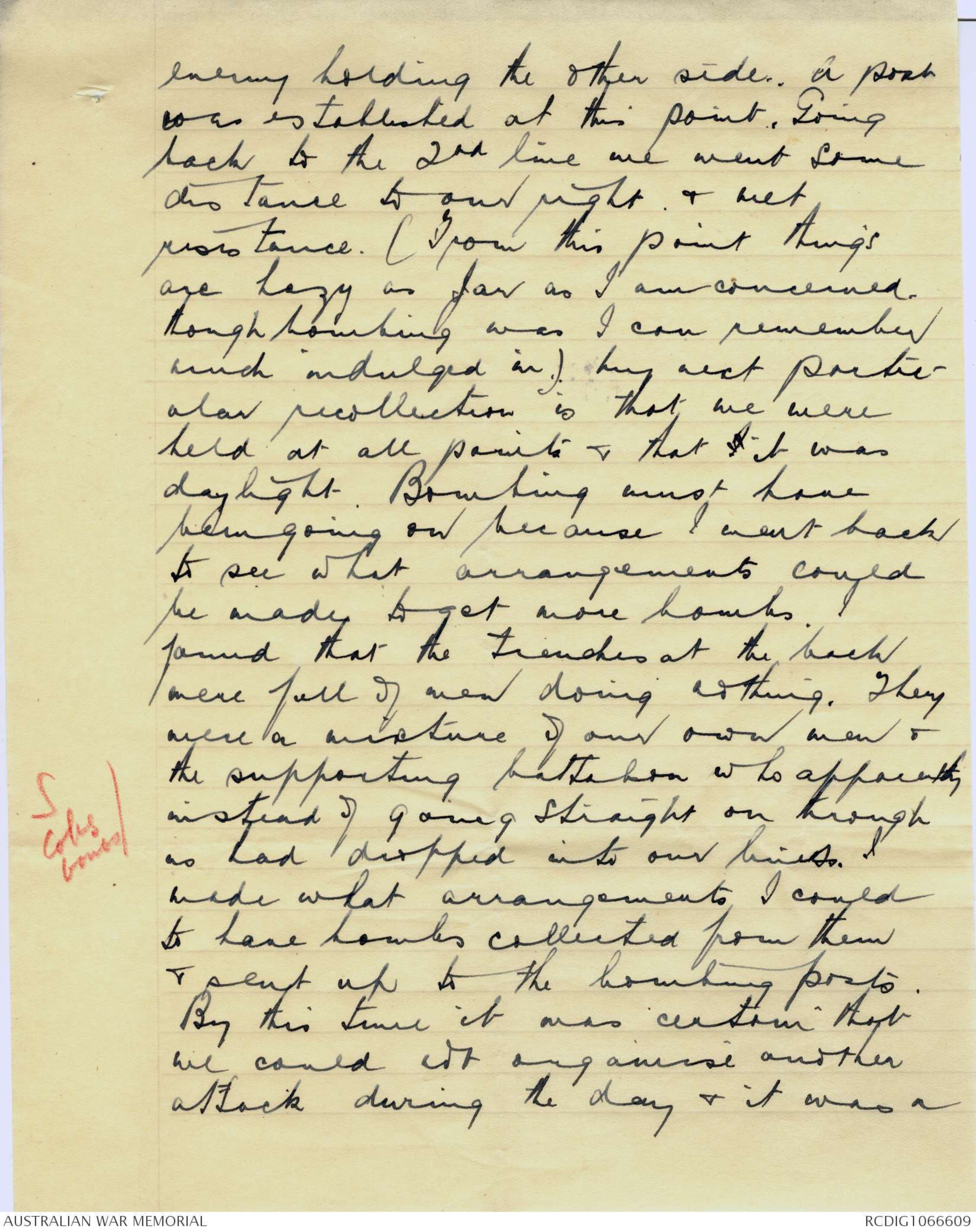
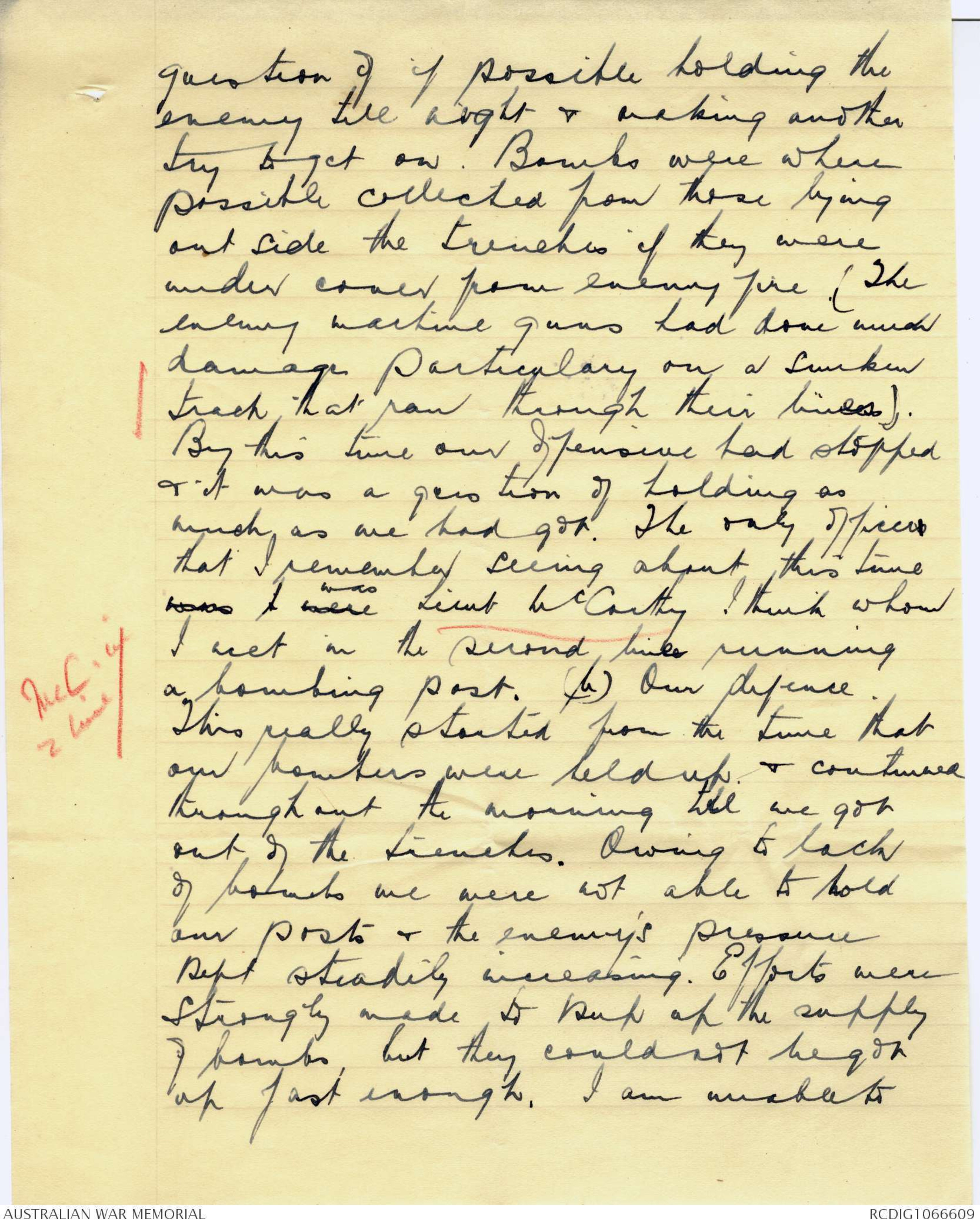
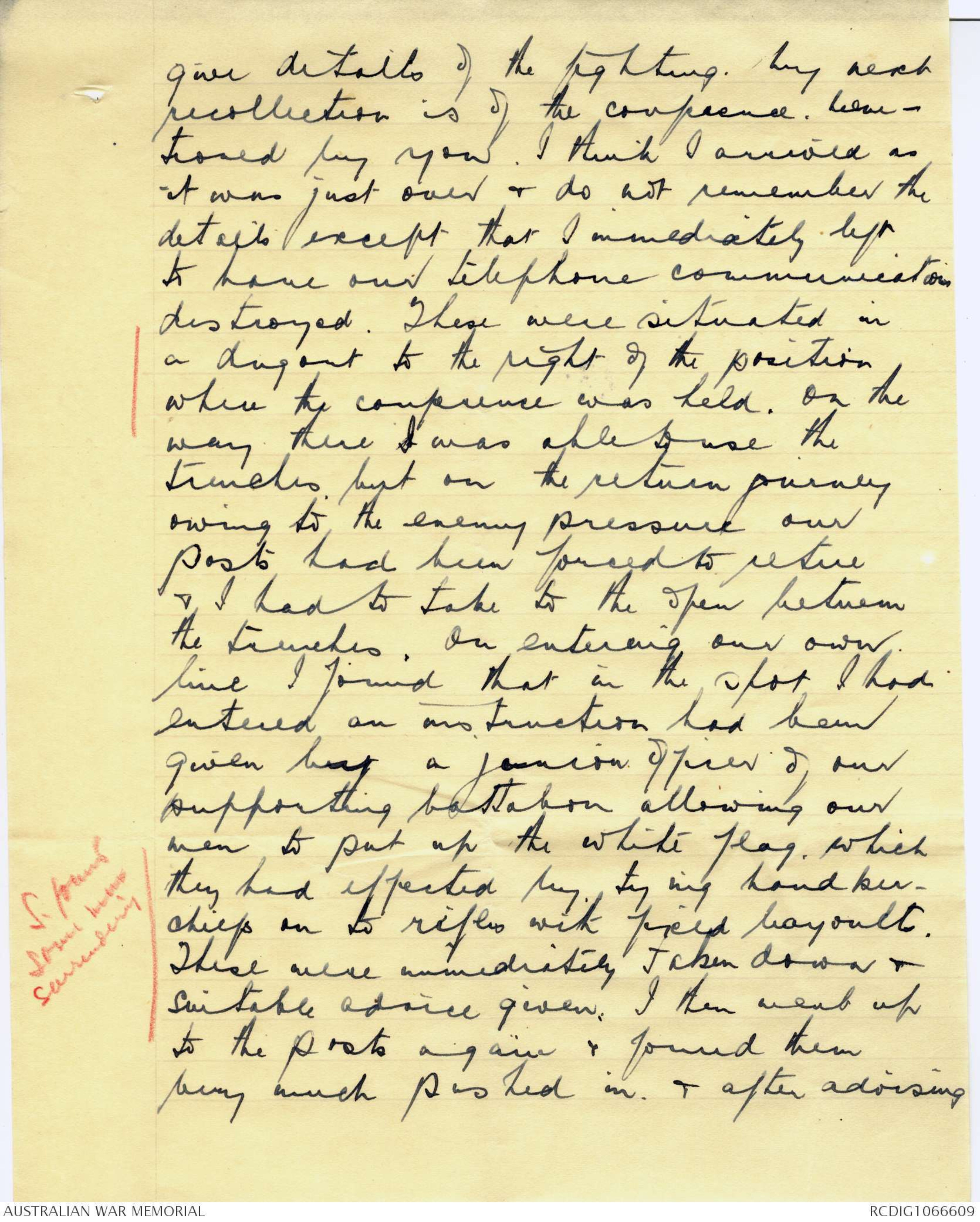
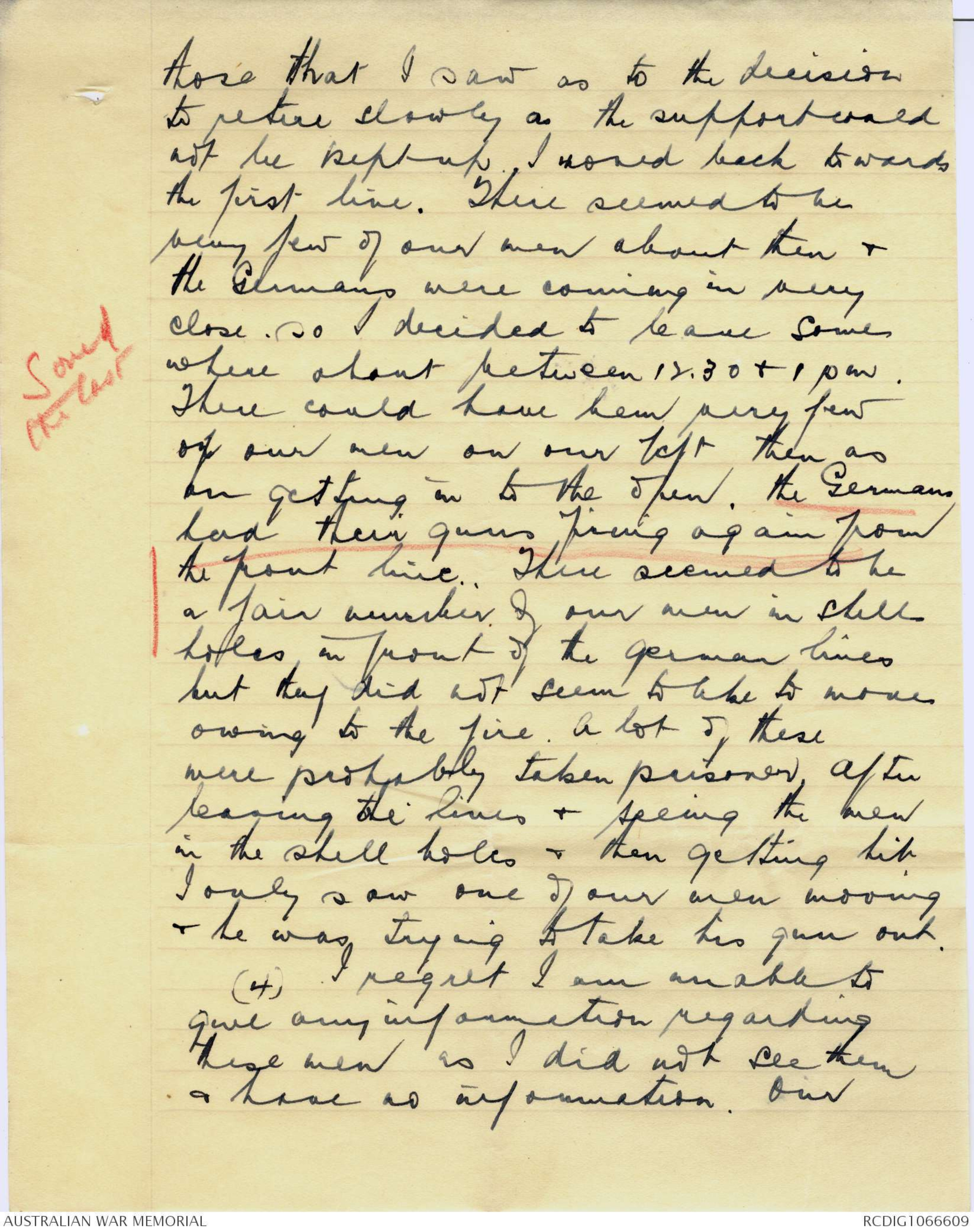
FL.4151
5842.
16 May 1930.
Captain R.S. Somerville, D.S.O., M.C.,
59, Wattle Street, East,
Fullarton Estate, S.Aust.
Dear Captain Somerville,
I have to thank you for your letter and for your offer
of further assistance. I should be very grateful if you could
give me the benefit of your recollection of the fighting at
Bullecourt on the 11th of April 1917. In particular, I should
be obliged for information on the following points:-
(1) What did you see of the tanks in your part of the
advance, and did you see any tanks in front of any other
part?
(2) Any particulars of the defence of the trenches, and
of other officers seen there.
(3) Did you take part in the conference about 11 o'clock
with Captains Gardiner, Murray, Hummerston, and others,
when the withdrawal was discussed and provisionally
decided upon.
(4) Any particulars concerning the few men who advanced
beyond O.G.2. towards Riencourt.
The fourth volume willbbe finished about the end of
next year; the narrative of Messines and the Third Battle of
Ypres having still to be completed.
Yours faithfully,
C.E.W. Bean.
[*Bullecourt I Capt Somerville (16th)
Denham.: The Bde orders for
11.4.17 cannot have
been clear or his
orders would have
been in accordance
with them.*]
5842
59 Wattle St East
Fullarton Estate
S.A.
28/5/30
The Official Historian
Dear Captn Bean
Yours of 16th Inst to
hand reference Bullecourt action
There is a certain
amount of information that I can
give you, though it will only refer
to a few main points owing to
the fact that the damage that I
received & the consequent following
unconsciousness has caused me to
forget most of the minor details.
(1) Tanks. Two or three points I can
bring to memory. (a) I noticed particularly
that the tanks were quite visible from
a good distance off owing to the
blue light that was continually
showing apparently from the top of
[*1*]
the tanks (b) That when we were about
300 yards from the enemy barbed
wire a tank stopped & held up our
advancing front wave owing to
its continuing to fire at the enemy
though it the crew apparently had lost
control & were unable to continue
to advance. This was on my left
front but before I reached it, some
one had apparently got the crew to
cease firing as the line commenced
to move forward again (c) The only
other tank that I remember particularly
noticing was one that got
to the enemy front line & stuck
there. This was on the right of where
I entered the trenches, & was so
under the enemy gun fire that
that spot was avoided by the infantry
as particularly dangerous.
(I regret that I am not able to give
map references as all my papers
maps etc were removed). I have
no clear recollection of any other tanks
in the action.
(2) Defence of the trenches. (a) Enemy
The wire where I first attempted to
enter was not broken & to find an
opening (as it was too thick to go through)
I had to move down to the right.
We got an opening there which I
think had been opened up by shell
fire. The machine gun defence at
this time was very strong the enemy
firing along his own lines of wire.
There was a large collection of
men at this point, they apparently
having come from the right also owing
to lack of openings. One remark I
have heard since by a man who was
lying wounded outside the wire was
to the effect that "the wire seemed to
be a mass of fire flies owing to the
sparks caused by the bullets striking
the wire".) On going through we
entered the front line moving along
till we came to a sap running back
[*S via C.T.*] to the second line. Passing down this
we we cleared a dug out & collected
a ^further couple of prisoners who had come
across diagonally from the right, from
the front line & were making for the sap
to effect an escape to the rear. Leaving
these men under control we moved
on to the second line. I think the com -
[*? Came later*] xxx communication trench ran straight
on through. At any rate at this
corner, I stopped to see how things
were going on our flanks. There
was not much happening on the
right of me but on my left in the
German second line a German
machine gun was mounted firing
at our men in the first line &
holding them up. A was Lewis gun
was obtained (whether this was with
me or whether I sent back for it
I cant remember). and the necessary
action taken to bring it into operation
from the side of the communication trench
where it continued past the second line.
At this time the men in the first line
were engaging the enemy gun with
machine gun & rifle fire from the
first line. Unfortunately on the Lewis
gun coming into action to fire
slightly in to the rear of the German
gun crew, our own men must have
taken it for a second German gun
as owing to lack of time we had not
been able to throwgh up a side protection
to mask the fire as they immediately
opened up on us & the gunner
dropped with a bullet wound through
the head. Deciding that there was no
time to take action to cover our
fire we moved down the trench to
the gun only to find that the gun had
been removed & I think 3 or 4 dead
Germans left there all being killed
with head wounds. We moved some
distance down this trench coming
across no one but one small
Australian & a big German down
with a bayonet wound. The A had
been moving down the trench towards
us away from towards us & the two had met
the boy getting in first & as a result
becoming very surprised. He was
still standing looking at his captive
when we reached him & immediately
asked what he was to do. The advice
given by someone was to "go on &
bayonet some more". Moving back
[*S. in Calwer*]
we continued on the communication
trench toward the rear, till I think
we came to an open road with the
enemy holding the other side. A post
was established at this point. Going
back to the 2nd line we went some
distance to our right & met
resistance. (From this point things
are hazy as far as I am concerned
though bombing was I can remember
much indulged in). My next particular
recollection is that we were
held at all points & that I it was
daylight. Bombing must have
been going on because I went back
to see what arrangements could
be made to get more bombs. I
found that the trenches at the back
were full of men doing nothing. They
were a mixture of our own men &
the supporting battalion who apparently
[*S Cobs
bombs*]
instead of going straight on through
us had dropped into our lines. I
made what arrangements I could
to have bombs collected from them
& sent up to the bombing posts.
By this time it was certain that
we could not organise another
attack during the day & it was a
question of if possible holding the
enemy till night & making another
try to get on. Bombs were where
possible collected from those lying
outside the trenches if they were
under cover from enemy fire. (The
enemy machine guns had done much
damage particulary on a sunken
trench that ran through their lines).
By this time our offensive had stopped
& it was a question of holding as
much as we had got. The only officer
that I remember seeing about this time
was I were was Lieut McCarthy. I think whom
[*McC in
2 line*]
I met in the second line running
a bombing post. (b) Our defence.
This really started from the time that
our bombers were held up & continued
throughout the morning till we got
out of the trenches. Owing to lack
of bombs we were not able to hold
our posts & the enemy's pressure
kept steadily increasing. Efforts were
strongly made to keep up the supply
of bombs but they could not be got
up fast enough. I am unable to
give details of the fighting. My next
recollection is of the conference. mentioned
by you. I think I arrived as
it was just over & do not remember the
details except that I immediately left
to have our telephone communications
destroyed. These were situated in
a dugout to the right of the position
where the conference was held. On the
way there I was able to use the
trenches but on the return journey
owing to the enemy pressure our
posts had been forced to retire
& I had to take to the open between
the trenches. On entering our own
line I found that in the spot I had
entered an instruction had been
given by a junior officer of our
supporting battalion allowing our
men to put up the white flag which
they had effected by tying handkerchiefs
on to rifles with fixed bayonets.
[*S found
some men
surrendering*]
These were immediately taken down &
suitable advice given. I then went up
to the posts again & found them
very much pushed in & after advising
those that I saw as to the decision
to retire slowly as the support could
not be kept up, I moved back towards
the first line. There seemed to be
very few of our men about then &
the Germans were coming in very
close. so I decided to leave some
where about between 12.30 & 1 pm.
[*Some of
the last*]
There could have been very few
of our men on our left then as
on getting in to the open the Germans
had their guns firing again from
the front line. There seemed to be
a fair number of our men in shell
holes in front of the german lines
but they did not seem to like to move
owing to the fire. A lot of these
were probably taken prisoner after
leaving the lines & seeing the men
in the shell holes & then getting hit
I only saw one of our men moving
& he was trying to take his gun out.
(4) I regret I am unable to
give any information regarding
these men as I did not see them
& have no information. Our
 Deb Parkinson
Deb ParkinsonThis transcription item is now locked to you for editing. To release the lock either Save your changes or Cancel.
This lock will be automatically released after 60 minutes of inactivity.